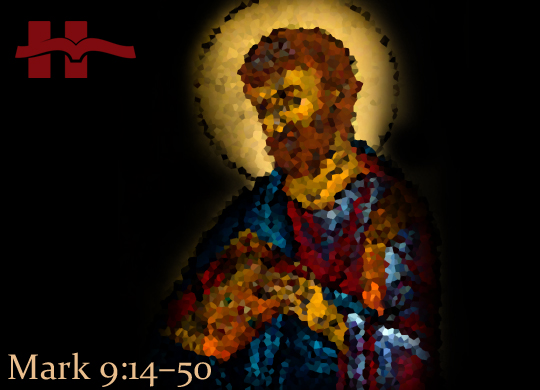Mark 9:14–50

The humble disciple, faithfully dependent on God’s power in prayer, serves the last and least.
“If anyone wishes to be first, he shall be last of all and servant of all.”
Mark 9:35
The prominent theme in this pericope, that commences with the healing of a demon-possessed boy, is humility.
Reinforcing the intensity of the demonic struggle, the affliction of the boy, with its etiology and its symptoms, gets extended coverage in the account: 9:17–18, 20, 22, 26. As 9:19 indicates, Jesus expected his disciples to be capable of handling even such an advanced degree of demon possession. They, however, did not succeed—lacking faith, are discomfited, defeated in their power struggle with this demonic force (9:18-19). Jesus’ answer to the disciples’ question of why they were not able to perform the exorcisms is illuminating: such actions, Jesus declares, call for prayer (9:28–29). In other words, Christ-followers must humbly depend on God for his help and for his power to work through them.
It appears that the disciples may have been so taken with their own authority and ability that they had attempted an exorcism without seeking help from God in prayer. Perhaps in light of their earlier success in this arena (6:13), they had begun to look upon themselves as experts at exorcism, capable of accomplishing these marvels on their own strength, by their own resources. Their problem was a lack of humble dependence on Jesus’ power. Intrinsic authority was his alone; they needed to rely upon him, even when exercising their own empowerment. Automatic power is not the currency in God’s economy; rather it is a deputized power that must at all times be in dependence upon its source: God. There was to be no place for presumption and pride in the disciple who followed Jesus. The disciples’ humiliation, here, was hopefully teaching them humility. Divine power is not a manipulatable force, but a gift that comes with utter dependence upon God as evidenced by prayer.
Indeed, the only one whose prayer in this pericope resulted in the casting out of the demon is the father who prayed: “I believe; help my unbelief!” (9:24). This was the attitude the disciples should have had, an attitude of trustful dependence expressed in prayer. The father’s exclamatory “prayer” simultaneously confesses confidence in the power of God in Jesus, and a lack of confidence in his own ability, even to maintain faith.
Then comes the second Passion Prediction of Jesus (9:31). As in the first (8:31), the disciples demonstrate their blindness of kingdom values (9:33–34). They are only looking out for themselves and contending about who would be the greatest; they, like all of us, would rather have the glory. Here again the issue is pride, continuing the theme from the previous episode of the failed exorcism. In reply to the disciples’ self-engrossment and ambition, Jesus makes a profound statement (9:35–37): the highest status in the kingdom of God is appointed for those who are last of all and who are servants of all.
Despite Jesus’ admonition, at least one of the disciples, John, still does not get it (9:38), and so Jesus resumes his reeducation program for his followers with a series of brief, but explosive, sayings (9:39–50). The entire section unveils a facet of discipleship essential for those who would follow Jesus—what it means to be humble in service to others.
Thus, two parallel thrusts are visible in this pericope: the humble disciple depends on God’s power, without being presumptuous; and the humble disciple serves the least, without being arrogant.












 Abe Kuruvilla is the Carl E. Bates Professor of Christian Preaching at The Southern Baptist Theological Seminary (Louisville, KY), and a dermatologist in private practice. His passion is to explore, explain, and exemplify preaching.
Abe Kuruvilla is the Carl E. Bates Professor of Christian Preaching at The Southern Baptist Theological Seminary (Louisville, KY), and a dermatologist in private practice. His passion is to explore, explain, and exemplify preaching.